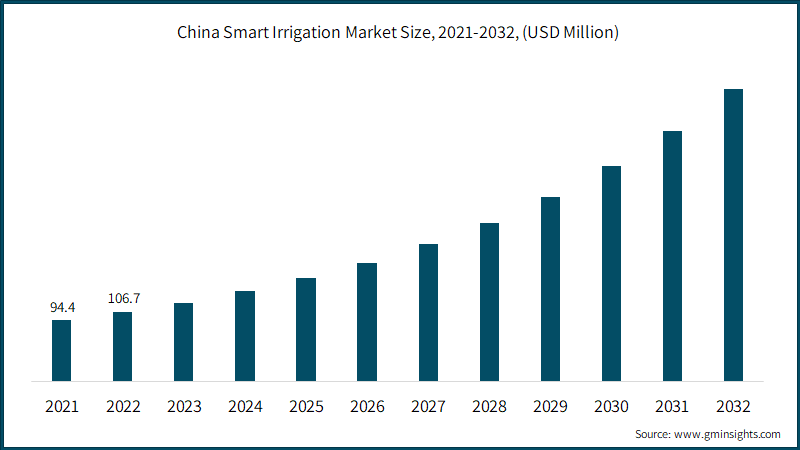Home > Agriculture > Agri Machinery & Tech > Agri Equipment > Smart Irrigation Market
Smart Irrigation Market Analysis
- Report ID: GMI5992
- Published Date: Jun 2023
- Report Format: PDF
Smart Irrigation Market Analysis
The climate-based segment held over 10.5% of the smart irrigation market share in 2022. The climate-based system allows precise water planning based on real-time weather data and the evapotranspiration rates. These systems help in water conservation by mixing water as per the actual needs of plants, thereby preventing over-watering and reducing water wastage. The rising focus on water conservation and sustainable water management is leading to the adoption of climate-based smart irrigation solutions. In addition, the government initiatives & policies that promote water conservation and sustainable agriculture are driving the use of climate-based smart irrigation systems. Empowerment, financial support, and efficient water management encourage farmers and organizations to use innovative technologies. Support policies create an enabling environment for climate-based business to flourish in the smart irrigation industry.

The smart irrigation market from controller segment dominated around USD 700 million with the volume of over 4.9 million units in 2022. Increasing water conservation and sustainable practices in agriculture are driving the use of smart water technology. These controllers improve water usage by adjusting water activity based on air, soil moisture, and the crop water needs. Smart controls provide the sustainable management of water by reducing water wastage and increasing water efficiency. In an addition, Government initiatives & policies that promote water conservation and efficient water use play an important role in driving the use of smart water technology. Incentives, subsidies, and water quality policies encourage farmers and organizations to invest in technologies including smart controls, thereby contributing to the overall market growth.
The smart irrigation market from non-agriculture segment is set to register a CAGR of 11.5% through 2032. Smart irrigation is increasingly being utilized in commercial properties such as office complexes, shopping malls, hotels, and industrial sites. These properties often feature extensive outdoor landscaping that requires regular irrigation. Smart irrigation systems enable precise control and automation of irrigation processes, optimizing water usage and reducing maintenance costs for commercial property owners.
Furthermore, the non-agricultural segment of the smart irrigation industry offers opportunities to improve water use, conserve resources, and improve sustainability and aesthetics in many areas. Adopting smart water management in non-agricultural applications generally saves water and promotes environmentally friendly practices across a wide range of industries.

Asia Pacific smart irrigation market accounted for 20% revenue share in 2022. The Asia Pacific region has a large agricultural sector, where a part of the population is engaged in agriculture & farming activities. The increasing demand for food coupled with the need to improve water usage in agriculture ensures the effective use of the resource. The benefits of smart water usage in crop improvements, water efficiency and the overall agricultural performance are rapidly gaining recognition.
Rapid developments in technologies, such as IoT, data analytics, and wireless connectivity, are also driving the market revenue in Asia Pacific. These technological advancements enable real-time monitoring, remote control, and data-driven decision making in pipeline management. The increasing affordability & accessibility of these technologies support their adoption in various agricultural areas of Asia Pacific.

